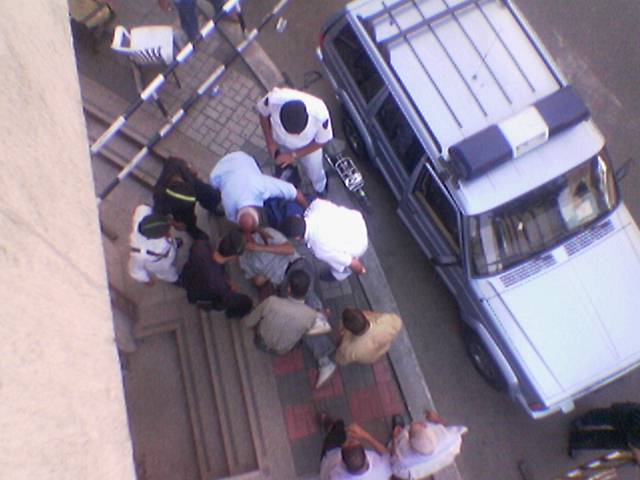Despite the rising anger at pro-US Arab regimes for their stance on Lebanon — here in Egypt one editorialist recently wrote of day-dreaming about the plane of Arab foreign ministers going to Beirut being shot down by Israel while the opposition press is savaging Mubarak for his stance — it’s clear that among the winners of the Israel-Palestine-Lebanon war are old autocrats like Hosni Mubarak. Neil King and Yasmine Rashidi write in the
With radicalism on the rise and battles flaring from Beirut to Baghdad to Gaza, the Bush administration’s quest for democracy in the Middle East is literally under fire. So while Ms. Rice portrays the fighting in Lebanon as “the birth pangs of a new Middle East,” the administration is also showing new eagerness to maintain pillars of the old Middle East — particularly America’s steadiest allies in the region, the autocracies of Egypt, Jordan and Saudi Arabia.
Last month, Ms. Rice delayed her departure to the Middle East to meet with Saudi Arabia’s foreign minister, Prince Saud al-Faisal, who received an unusual Sunday audience with President Bush. Ms. Rice went on to praise Egypt, Jordan and Saudi Arabia repeatedly during her trip. Hosni Mubarak, president of Egypt for 25 years, is back in Washington’s good graces, after being chastised last year for his country’s lackluster embrace of democratic change. Mr. Mubarak’s son and heir-apparent was recently hosted by the administration, which also tamped down a congressional attempt to cut funding to the country.
“There’s been a very loud sigh of relief within the White House…that there are still some stable, highly centralized countries in the region to turn to,” says Aaron Miller, a veteran Middle East adviser to four administrations — including the current one. He now works at the Wilson Center, a Washington, D.C., research institution.
It was Israel’s bombardment of Lebanon, designed to cripple the Hezbollah militant group, which most recently underscored America’s need for friends in the region. At the fighting’s onset, the Bush administration relied heavily on support from Egypt, Jordan and Saudi Arabia, whose governments were quick to criticize Hezbollah’s attacks on Israel. During the past week, however, these three countries have become significantly more critical as the unrest worsens.
The violence in Lebanon also highlighted what critics say are contradictions in the Bush democracy quest. For one, the administration now has to rely on autocratic leaders as it pursues its goal of ridding the region of autocratic leaders. Moreover, the region’s worst unrest is in the three places Washington has pushed hardest for democratic change: Iraq, Lebanon, and the Palestinian territories.
. . .
Many observers in Cairo note that the U.S.’s democracy push, and the resulting rise of Islamist fervor, has given the Egyptian government a ready-made reason to backtrack on its promises. “It’s the same thing again. We take steps forward and then leaps back,” says Ibrahim Hassan, an Egyptian lawyer who was involved in the demonstrations demanding more autonomy for the judiciary. “This time it’s the perfect excuse — the U.S. would never stand to allow the Brotherhood to take over Egypt.”
Hisham Kassem, the founder of Al-Masry El-Youm, an opposition newspaper, and a prominent critic of the regime, sees the easing of U.S. pressure in Egypt as basic realism. “The U.S. can’t afford a collapse of the regime,” says Mr. Kassem. “They can lobby and use certain leverage, but to bring down the regime is not an option.”
So where does that leave Egyptians who want change? To take a risk and forge new alliances with Islamists, that’s where.
